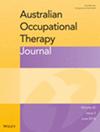Addressing client spirituality in occupational therapy practice: A qualitative study
Abstract
Introduction
Aspects of spirituality are commonly brought up by clients during times of sickness, disability, and impending death. However, much of the research on how to address spirituality in Australian health care has been conducted by professionals outside of occupational therapy. In this context, this study aimed to examine how Australian occupational therapists address spirituality in their clinical practice.
Methods
This study undertook an interpretive phenomenological qualitative approach to thematically analyse 23 individual interviews of Australian occupational therapists from multiple practice settings.
Consumer and Community Involvement
As the target participants were occupational therapists, consumers and the community were not involved in the design of the research.
Findings
The three themes that emerged from this study were the following: (i) participants employed flexible approaches when asking about clients' spirituality; (ii) clients raised a diverse range of spiritual topics; and (iii) occupational therapists provided varied responses to address client spirituality.
Conclusion
The findings suggest that spirituality is a rich and varied part of occupational therapy practice. Many participants had developed creative ways to integrate spirituality into their practice, often without formal training. Therapists' preferred methods for asking clients about their spirituality were generally informal and flexible in nature. Additionally, clients introduced a range of positive and challenging topics, whereas some did not bring up spirituality at all. Therefore, occupational therapists may benefit from using open questions that encourage exploration. The varied responses to client spirituality offer an opportunity for therapists to reflect on how best to support it. This may involve increasing self-awareness of their personal beliefs, establishing referral pathways to spiritual experts, and creating guidelines for self-disclosure and participation in spiritual practices. Improving professional resources on addressing spirituality could further assist occupational therapists in asking about and responding to the spirituality of their clients.
PLAIN LANGUAGE SUMMARY
Most research on spirituality in Australian health care has come from other professions, not occupational therapy. This study looked at how Australian occupational therapists talk about and respond to clients' spiritual needs in their work. Researchers interviewed 23 occupational therapists. They found three main things: (1) therapists used flexible ways to ask about spirituality, (2) clients talked about many different spiritual topics, and (3) therapists responded in many different ways. These therapists came up with their own creative ways to support clients' spirituality. The profession could benefit from more tools and guidance on how to talk about and respond to spirituality in practice.


 求助内容:
求助内容: 应助结果提醒方式:
应助结果提醒方式:


